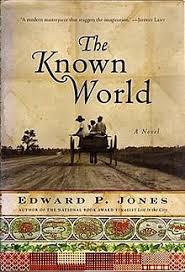
The known world
Harper Perennial. 2003. 388 sidor.
Mycket gott skick.
Set in Manchester County, Virginia, 20 years before the Civil War began, Edward P. Jones's debut novel, The Known World, is a masterpiece of overlapping plot lines, time shifts, and heartbreaking details of life under slavery. Caldonia Townsend is an educated black slaveowner, the widow of a well-loved young farmer named Henry, whose parents had bought their own freedom, and then freed their son, only to watch him buy himself a slave as soon as he had saved enough money. Although a fair and gentle master by the standards of the day, Henry Townsend had learned from former master about the proper distance to keep from one's property. After his death, his slaves wonder if Caldonia will free them. When she fails to do so, but instead breaches the code that keeps them separate from her, a little piece of Manchester County begins to unravel. Impossible to rush through, The Known World is a complex, beautifully written novel with a large cast of characters, rewarding the patient reader with unexpected connections, some reaching into the present day. --Regina Marler --This text refers to the Hardcover edition.
From Publishers Weekly
In a crabbed, powerful follow-up to his National Book Award-nominated short story collection (Lost in the City), Jones explores an oft-neglected chapter of American history, the world of blacks who owned blacks in the antebellum South. His fictional examination of this unusual phenomenon starts with the dying 31-year-old Henry Townsend, a former slave-now master of 33 slaves of his own and more than 50 acres of land in Manchester County, Va.-worried about the fate of his holdings upon his early death. As a slave in his youth, Henry makes himself indispensable to his master, William Robbins. Even after Henry's parents purchase the family's freedom, Henry retains his allegiance to Robbins, who patronizes him when he sets up shop as a shoemaker and helps him buy his first slaves and his plantation. Jones's thorough knowledge of the legal and social intricacies of slaveholding allows him to paint a complex, often startling picture of life in the region. His richest characterizations-of Robbins and Henry-are particularly revealing. Though he is a cruel master to his slaves, Robbins is desperately in love with a black woman and feels as much fondness for Henry as for his own children; Henry, meanwhile, reads Milton, but beats his slaves as readily as Robbins does. Henry's wife, Caldonia, is not as disciplined as her husband, and when he dies, his worst fears are realized: the plantation falls into chaos. Jones's prose can be rather static and his phrasings ponderous, but his narrative achieves crushing momentum through sheer accumulation of detail, unusual historical insight and generous character writing.
Copyright 2003 Reed Business Information, Inc. --This text refers to the Hardcover edition.











